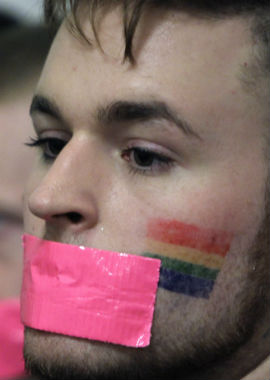In the last two weeks, two cases of attacks on gays in the Rua Augusta region have circulated on Facebook and in the mainstream press, which, once again, shocked everyone and, now, make me reflect on the role we (we, gays) have , or that they allow us to have, in the society in which we live.
In the early hours of January 26th (Sunday), after leaving a party on the outskirts of Frei Caneca with two other friends, Bruno Borges, 18, was beaten to death and then robbed.
More recently, on February 2nd (Sunday) it was the turn of Juliano Zequini Polidoro, aged twenty-six, being beaten, on Rua Augusta, while walking towards the Consolação subway. Fortunately, he survived the attack and made his complaint, with an air of perplexity, on social media.
In a few words, the victim summed up very well the feeling we share of insecurity: "I feel humiliated. You are knocked down, kicked and your only right is to put your head down and go home? Is that the right of a gay man? All three in the morning, what would my right be?
Good question: after all, what is a gay person’s right? In the wonderful – and, for us, not always so wonderful – world of laws, we are all citizens, holders of rights and duties, without distinction of any kind. This is what is stated in the Federal Constitution, in its article 5.
Our duties, I believe, we have performed well. I repeat the old “good man” speech. We pay our taxes and work, like anyone else, helping to make our country's economy run. On weekends, we promote big parties and color the gray streets of our São Paulo, giving life to one of the best nights in the world.
The recurring and cruel attacks of which we are victims, however, make me certain that, unfortunately, all of this is not enough for people to take us seriously. To paraphrase Negra Li, "gay in Brazil is never taken seriously".
We have the feeling that, systematically, the Public Power, our culture and society ignore what is happening. Otherwise, attacks, like the recent ones, would be combatted with preventive policing, homophobes would feel embarrassed not to express their hatred and, if they still did so, they would be persecuted by rebellious people in the face of barbarity.
Under the law, we gays have the right to individual security and that of our identity community. No, there is no law that explicitly says this, nor do we need it; or we shouldn't need it. For the simple fact that we are here and are part of society, we should be respected.
As this does not happen, we rely on specific laws. In São Paulo, for example, we have State Law no. 10.948/2001, which punishes, at the administrative level, homophobic practices by individuals and legal entities. The penalties range from a simple warning to include fines between approximately R$20.000,00 and R$60.000,00, and can go as far as suspension and revocation of state operating licenses (for companies).
As laws are not enough to change reality, we also count (or should count) on the collaboration of the Executive and Judiciary branches in affirming a culture of respect for gays.
As incredible as it may seem, it is precisely in these two areas that we have had the most achievements. Far from detailing them all, it seems convenient to me to point out specific cases of major proportions.
It is from the Judiciary that practically all of our specific rights came (always with a lot of effort): changing the first name and sex of transvestites and transsexuals, in 2011, by the STJ; stable union, in 2011, by the STF; and the marriage, in 2013, by the CNJ.
The Executive, in turn, has advanced and expanded the protection of gay rights through the Sexual Diversity Affairs Coordinators. In São Paulo, for example, the São Paulo City Council's LGBT Policy Coordination, currently led by Julian Rodrigues, obtained its biggest budget in history, with more than R$4 million for 2014. This amount will be allocated to fulfilling the City Hall's Target Plan, which, in number 61, provides for the development of actions to combat homophobia and respect sexual diversity.
The scenario, therefore, is not the worst. In official discourse, today, we almost always have a guaranteed place. If there is no shortage of legislation, public policies and sympathy from judges, why do we, gays, still occupy the role of second-class citizens?
In this column it would be very difficult to indicate all the reasons for this. Maybe it's time to continue the theme in the coming weeks. But, for now, I continue to insist that there is a lack of articulation and systematic commitment from institutions and social actors.
What I mean by this? I want to say that the three powers still need to be sensitized with data about the reality we experience; they cannot excuse themselves from their responsibility for our deaths by assuming a comfortable position of neutrality.
And until this happens, until culture, civil society and public authorities are genuinely committed to protecting us, every Sunday we will hear of yet another hate crime.
And let's be sure, if we are not the victims, there is still an extensive list of other vulnerable minorities: women, black people, migrants, immigrants (Bolivians, Peruvians, Paraguayans, Africans, Asians) and indigenous people, for example.
The homophobic attacks that have occurred and, we know, will still occur remind us that democracy is not given, but daily conquered. Hence the need for resistance and solidarity within and between minority groups.
*Thales Coimbra is a specialist in LGBT law; graduated and master's degree in legal philosophy from the Faculty of Law of USP, where he studies homophobic hate speech; he is the founder and coordinator of Geds – Study Group on Law and Sexuality; www.rosancoimbra.com.br/rightlgbt



